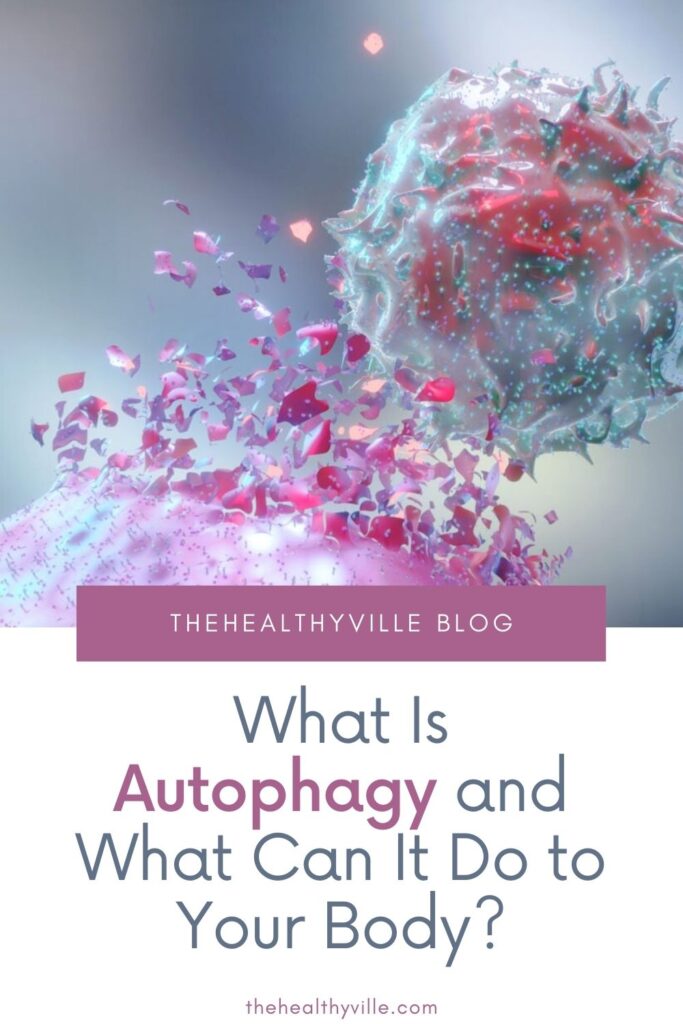What is autophagy? Why do you need to know about it? What can it doo to your body? Is it effective or dangerous? Find out all the answers!
The concept autophagy comes from the Greek words autos (‘oneself’) and phagein (‘eat’ or ‘feed’).
It is a natural process in the body where a renewal of damaged cells happens, which regenerate with new, healthy ones. It’s about cleaning toxic and recycling valid components.
Some benefits for human health have been attributed to this mechanism. The possibility of inducing it through fasting and other strategies is also highlighted. But it must be borne in mind that it is a field in which there is still much to be investigated
What is autophagy?
This concept appeared in 1960; two scientists have been awarded the Nobel Prize for their research in this field. Both introduced the idea and deepened its definition, activation and possible relationships with human health.
All cells in the human body can be damaged throughout life. When damaged, they have small vesicles that move inside them and are responsible for removing the affected components, converting them into energy and other essential molecules. This process is activated constantly, but at a low intensity.
Autophagy is also activated under other circumstances, such as a lack of energy. In this case, it is possible to supply the demand for nutrients and other necessary elements while delaying aging.
Benefits of autophagy in the body
There is growing scientific evidence about the implication that this cellular mechanism has in the appearance of some diseases. A malfunction of the process is related to aging, neurodegeneration, cancer and microbial infections.
For this reason, there is no doubt that autophagy has a protective effect against some health problems, such as neurodegeneration. Protection occurs by reducing the accumulation of damaged proteins in the brain.
In addition, it has the ability to strengthen the immune system.
A malfunction of autophagy links directly to cancer. It has been one of the first situations to be studied. Some malignant transformations may appear as a consequence.
Autophagy activates the immune system and participates in surveillance against these malignant cells. However, the relationship also occurs in reverse, since the latter benefit from it for their survival and proliferation.
How can you achieve it?
The autophagy process that triggers automatically when the body goes through a stressful situation. Externally, you can induce it with the following 3 mechanisms.
-
Fasting
Restricting your food intake for a time is one of the most effective ways to achieve autophagy. In the beginning, it does not need to be very long to be able to observe some of the benefits discussed.
There are 3- to 7-day abstinence fasts, but other forms of fasting have become more popular in recent years. Its implementation can be gradual:
- Intermittent fasting: it is about eating the usual amounts, but in a shorter window of time. In fact, it is a practice that almost everyone does during sleep hours. So one of the best ways to practice intermittent fasting is to eat dinner earlier and have breakfast later.
- Intake restricted in time: very similar to the previous one, although in this case the emphasis is on the moment in which you make the meals. These should be during the period when the body is most receptive to food, which happens during the day. Therefore, eating in the dark hours is not okay.
- The frequency and duration of fasts is variable. For example, it is possible to do a long fast (24 hours without eating) one day a week or a month. Or do a 16/8 fast (eat in an 8 hour interval), 2 or 3 days a week.
-
Ketosis and ketogenic diet
Not all people and not all situations are ideal for fasting. In this case, a type of diet that induces a state of ketosis is another way to achieve the benefits related to autophagy.
Ketosis is a state in which the body uses its own body fat as an energy source. This occurs during fasting, but also with a diet low in carbohydrates, moderate in protein and higher in fat.
-
Physical exercise to induce autophagy
Sport, physical activity and muscle training is the last of the 3 possible mechanisms to activate this process in the body. It kicks in, as muscle cells suffer damage and inflammation and boost the activity of repair molecules.
In addition, those responsible for an article published in the journal Physiological Reports demonstrate with their study that training and exercise increase the capacity of autophagosomes in human skeletal muscle.
When to seek professional help
Before making changes in diet or lifestyle, with the aim of inducing autophagy, it is advisable to consult a health professional. This is even more important in some situations, such as pregnancy and breastfeeding, when you have chronic diseases (such as diabetes or heart problems) or when you are taking medications.
Otherwise, a poor performance of this type of diet can lead to relevant problems, such as eating disorders or imbalance in metabolism. The breakdown of muscle protein or the alteration in physical performance is also a risk.
Autophagy is an organic process with potential benefits
Autophagy occurs naturally in cells. For the cells, it is a recycling process, so that there’s elimination of the components that had deterioration or use them to build new molecules or obtain energy.
Researchers have found that its failure can produce negative health effects. In recent years it has gained popularity when it has been related to weight loss, aging and protection against some diseases.
However, it is a scientific field with a long way to go. Therefore, experts recommend seeking advice for any change that you want to implement with a view to enhancing autophagy.
Don’t forget to SHARE what is autophagy with your friends and family on your social networks!

